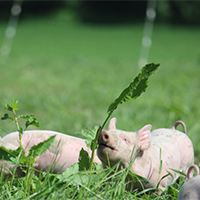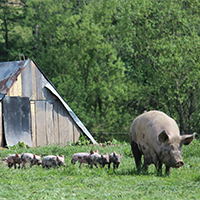ProPIG – Farm specific strategies to improve organic pig production in Europe
The goal of the ProPIG project was to compare three husbandry systems for organic pigs (indoor with outside run, outdoor, partly outdoor) across Europe regarding animal welfare and environmental impact. Furthermore, the potential to reduce the environmental impact from organic pig production by means of farm specific strategies to improve animal health, welfare and nutrition was examined.

A total of 74 organic pig producers in 8 European countries participated in the project and were visited three times: Firstly data on farm management, husbandry, feeding, animal health and welfare were collected, which served as the basis for the second visit during which farmers were asked to select farm specific goals and measures to achieve these goals.
The farmers chose primarily reproduction, nutrition and health as focus areas for on-farm improvement and successfully implemented strategies to achieve change, which was documented during the third visit. These suggestions for improvement strategies – jointly formulated by farmers and scientists – have been collected and are now available in a farmer handbook with the potential to be a very efficient tool for pig producers across Europe.
When comparing the three systems, it was shown that all systems can have low environmental impact, measured as potential accumulation or emission of greenhouse gases, nitrogen and phosphorus. Weaners in outdoor farms had fewer respiratory problems and diarrhoea, and sows less lameness and MMA than in indoor farms. However, finishers kept in indoor systems had lowest mortality and best production results.
The three types of production systems for organic pigs
Together, different national organic regulations, welfare regulations and building traditions have promoted the development of a variety of housing systems, outdoor rearing and management strategies across the EU. This diversity offers real potential to aid improvement, if the ‘best’ can act as role models for others, and might be more effective than adapting practice derived from experimental systems.
The CoreOrganic I project “CorePIG” documented the wide variation of organic pig husbandry and management systems that exists in Europe and highlighted the potential value of further investigation. Therefore, at the beginning of the ProPIG project, management systems and production systems were defined, and the farms were divided into three categories:
- Indoor - pigs live in buildings with access to an outdoor run or a small sacrifice soil area for permanent pig use. Pigs may have access to soil but the area they occupy is not integrated into crop rotation on the farm.
- Outdoor - pigs live permanently outdoors with shelter for sleeping but unrestricted access to the soil (shelter could be a temporary hut or permanent building). Paddocks occupied by the pigs are integrated in the crop rotation, rather than being a sacrifice area for permanent pig use.
- Partly outdoor - pigs spend part of the year or production cycle in each system type; at least one production stage is fully housed while the rest is outdoors. A production stage could be dry sows, lactating sows, e.g. group suckling, weaned piglets or finishing pigs. The combination of indoor and outdoor production might occur within the same farm or in linked farms if piglets are produced on one farm but finished on another, or as seasonal housing of animals (seen in the ‘Swedish system’).
Improved health and welfare in organic pigs may be good for the environment
In order to be competitive, organic pig production should have a low environmental impact as well as good animal health and welfare. An improvement of health and welfare in organic pigs should result in reduced environmental impact due to reduced use of medicine, improved growth and higher feed conversion efficiency. In organic pig production, animal health and welfare can be improved by means of preventive initiatives, optimal disease treatment and innovative systems to manage outdoor areas (e.g. vegetation management).
The environmental impact was evaluated in the ProPIG project by means of life cycle assessments of the production chain, and by nutrient balance calculations at farm level and outdoor area level. Regarding the global warming impact, the three production systems did not differ. The variation in environmental impact within the individual production systems was bigger than the variation between the three production systems.
Animal health and welfare were evaluated using animal-based parameters, such as clinical assessment, analysis of treatment and productivity data as well as selected behavioural parameters.
The project showed that pigs that were outdoors all year round had advantages regarding respiratory problems, diarrhea in weaners, lameness and MMA in sows. In partly outdoor systems, where most commonly sows are kept outdoors, similar advantages for sow health were observed. However, production systems in which the pigs were indoors all year round displayed the best production results for slaughter pigs.

A booklet for farmers in Europe
By means of specially developed software (PigSurfer), data were collected twice from all herds regarding animal health, welfare, productivity, feeding, economy and environmental impact. The farmers were informed of the results via benchmarking reports as a starting point for setting their own goals and strategies in the form of a farm plan, which was revised during the final visit after one year to allow for continuous development.
Together with existing scientific knowledge, the measures implemented were brought together in the development of a handbook for farmers, which is now available to all organic farmers in Europe with versions in four languages: English, French, German and Czech.
The improvements have been jointly formulated by farmers and scientists and collected in the farmer handbook with the potential to be an effective tool for organic pig producers in the future. Furthermore, the joint European data collected in the PigSUrfer may be used by advisors and decision makers and may prove relevant in relation to future (political) decisions on the development of organic pig production. PigSurfer will be made available on the website in the near future.
ProPIG is funded by CORE Organic II funding bodies. It ended 31 December 2014.
Read more
Project website http://www.coreorganic2.org/propig
Organic Eprints http://orgprints.org/view/projects/ProPIG.html
Contact person:
Christine Leeb
Tel.: 0043-1-6648453961
E-mail: Christine.leeb@boku.ac.at